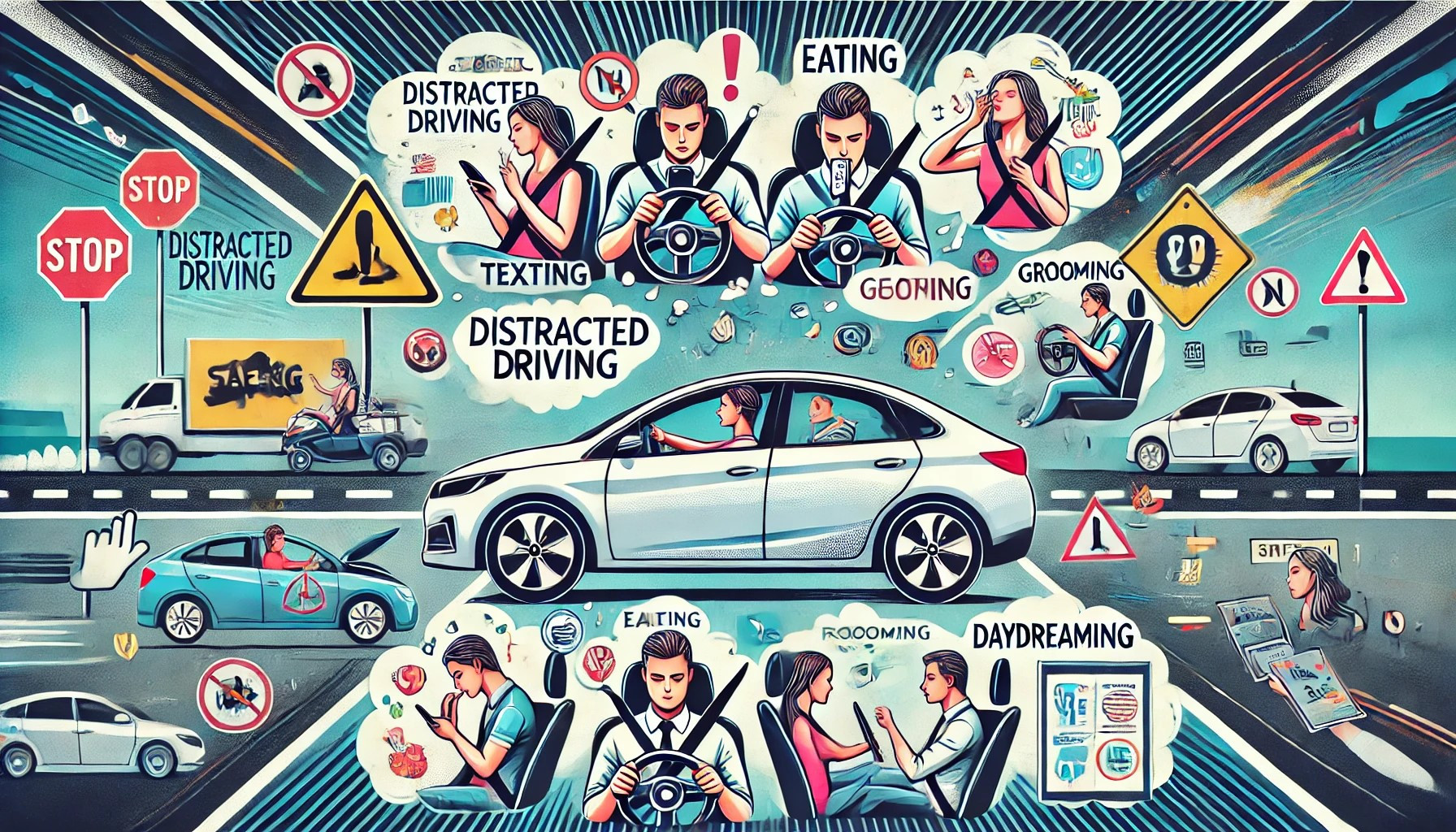The Dangers of Distracted Driving — and How to Avoid Them
Distracted driving is one of the most pressing issues on our roads today. It’s an alarming trend that has resulted in countless accidents, injuries, and fatalities. Understanding the dangers of distracted driving and how to avoid them is crucial for every driver, especially new ones. At Get Drivers Ed, we are committed to educating drivers about the importance of staying focused on the road. In this blog, we’ll explore the various forms of distractions, their impact on driving, and practical ways to avoid them.
What is Distracted Driving?
Distracted driving involves any activity that diverts attention from driving. This includes anything that takes your eyes off the road, your hands off the wheel, or your mind off driving. Common distractions include:
Texting or using a smartphone
Eating or drinking
Talking to passengers
Adjusting the radio or climate controls
Grooming activities, such as applying makeup or shaving
Daydreaming or letting your mind wander
Each of these activities significantly increases the risk of accidents, making it essential to understand and mitigate these distractions.
The Impact of Distracted Driving
Increased Accident Risk
Distracted driving is a leading cause of accidents. When a driver’s attention is divided, their reaction time slows down, and their ability to make quick decisions is compromised. According to the National Highway Traffic Safety Administration (NHTSA), distracted driving claimed 3,142 lives in 2019 alone. These statistics underscore the critical need for awareness and proactive measures to combat distracted driving.
Legal Consequences
Many states have enacted laws to combat distracted driving. In Texas, for example, texting while driving is illegal, and violators can face hefty fines and penalties. Drivers ed courses like those offered by Get Drivers Ed emphasize the importance of adhering to these laws to avoid legal repercussions. Understanding and complying with these laws not only prevents legal trouble but also promotes safer driving habits.
Higher Insurance Premiums
Drivers caught engaging in distracted driving behaviors may face increased insurance premiums. Insurance companies view distracted drivers as high-risk, leading to higher costs for coverage. A distracted driving citation on your record can significantly impact your insurance rates, adding a financial burden to the already serious consequences of this behavior.
Emotional and Psychological Impact
Being involved in a distracted driving accident can have long-lasting emotional and psychological effects. Guilt, anxiety, and stress are common among those who have caused or been involved in such accidents. Drivers ed programs focus on the importance of maintaining focus to avoid these traumatic experiences. Addressing the emotional repercussions of distracted driving is crucial for recovery and future prevention.
How to Avoid Distracted Driving
Put Your Phone Away
The most common distraction is the use of smartphones. To avoid this, keep your phone out of reach while driving. If you need to use your phone for navigation, set it up before you start driving and use hands-free options. Consider apps or settings that limit phone functionality while driving.
Plan Ahead
Ensure that all your adjustments, such as setting the radio, climate controls, and GPS, are made before you start driving. This minimizes the need to take your eyes off the road. Proper preparation can eliminate the need for adjustments that might lead to distraction while driving.
Limit Passengers
Teen drivers, in particular, should limit the number of passengers in the car. More passengers can mean more distractions. At Get Drivers Ed, we recommend that new drivers avoid driving with friends until they are more experienced. Limiting distractions in the vehicle can help young drivers focus on the road.
Avoid Eating and Drinking
Eating and drinking while driving can be incredibly distracting. It’s best to eat before you drive or wait until you reach your destination. Simple measures like this can significantly reduce the risk of distraction.
Stay Focused on the Road
Keep your mind on driving. Avoid letting your thoughts wander and stay focused on the road conditions and other drivers. If you find your mind drifting, make a conscious effort to refocus. Mindfulness techniques can help maintain concentration.
Use Technology Wisely
Many modern vehicles come equipped with features designed to minimize distractions, such as voice-activated controls and advanced driver assistance systems. Make use of these technologies to help you stay focused. However, be aware that even these technologies require your full attention and should be used responsibly.
Take Breaks on Long Trips
Fatigue can also lead to distractions. On long trips, take regular breaks to rest and recharge. This keeps your mind sharp and your focus on the road. Regular intervals for rest can prevent fatigue-related distractions and improve overall driving performance.
The Role of Drivers Ed in Preventing Distracted Driving
Drivers ed courses play a crucial role in educating new drivers about the dangers of distracted driving. At Get Drivers Ed, our comprehensive programs cover all aspects of safe driving, including strategies to avoid distractions. We emphasize real-world applications and practical tips to help our students become responsible drivers. Our goal is to instill habits that prioritize safety and awareness on the road.
Conclusion
Distracted driving is a significant threat to road safety, but it is entirely preventable. By understanding the risks and implementing strategies to stay focused, drivers can significantly reduce their chances of being involved in an accident. Get Drivers Ed is dedicated to providing the best education for new drivers, ensuring they have the knowledge and skills to stay safe on the road.
Ready to become a safer driver? Enroll in our drivers ed program today at Get Drivers Ed and learn how to avoid distractions and other common driving hazards. Drive smart, drive safe with Get Drivers Ed!

